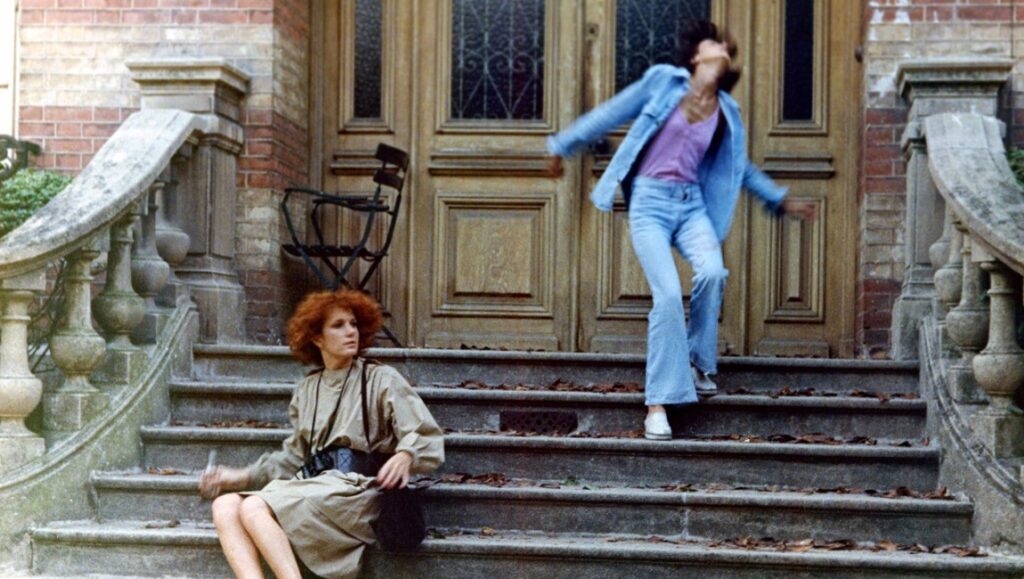Jacques Rivette works with actors like a child plays with dolls. His films are so lengthy because he often rewrites as his actors play out their scenes, allowing his mysteries to backtrack, rewind, and test new paths, creating a new, fluid narrative blueprint. Céline and Julie Go Boating is the most playful of his enigmatic puzzle boxes, and Céline (Juliet Berto) is, in effect, Lewis Carroll’s White Rabbit, dropping her possessions behind her for Julie (Dominique Labourier) to find. The two women play a game of cat and mouse, but they are also shapeshifters, changing roles in a cabaret, and meeting childhood sweethearts they’d never met before. While Julie, a librarian, should be more traditional and further from magic than the bohemian performer Céline, her tarot card readings bring her closer to fantasia, and she is the one who is able to look and see the future that lies behind her, and the past that lies before her.
The latter half is next to Martha Rosler’s menacing kitsch comedy Semiotics of the Kitchen (1975) in its derision of nuclear family house roles. At 7 bis, rue du Nadir-aux-Pommes, there is a mansion, quiet and closed off from Paris, that Céline once worked at as a nanny. She and Julie take turns entering the house — the realm of two sisters, a widower, and a sick child — in Céline’s former position as a caretaker. Every day, she is rejected back into the streets of Paris, and returns via taxi. She will have no memory of this, but completing a cycle that’s steadier than clockwork, a small candy is always lodged in her mouth. The goings-on in the house are like a stage play, a domestic melodrama where every day the young girl is murdered, and each line of dialogue is pre-scripted. Before the candy, acting as a Proustian madeleine, takes them back, the women play with the revolving reality, remembering more events each time they occur. The story becomes interactive; Rivette’s playthings, no longer just wandering in the lives of each other, are able to rewrite his direction and rescue Nathalie Asnar’s Madlyn before she is killed one day.
By leaving the House of Fiction, two worlds — a mundane, repetitive fantasy, and a magical, spontaneous reality — can return. Rivette works in a more concrete kind of abstraction here, one where we recognize the objects on the table before us, but do not recall their function. The audience is able to comprehend the action of Céline, Julie, and Madlyn in their rowboat, gliding along the river with joy, an emotion not yet shown when we’ve only seen its trickier cousin, wonder. What we don’t comprehend is their place in time, as there is precisely none; Madlyn comes from the past of one, and the future of another, and on this river they are all antiquated, each emerging from threads of reality where fantasy and magic do not coexist. The candy is not what brought Céline and Julie into the fiction, but it is what brings them back into reality. Rivette has left us with a reality where magic is not a part of fiction, but the aftertaste of it.
The idea of a boating trip first brings to mind the idea of a yachtsman. The yachtsman is a wealthy man, with time to take to the seas for pleasure, who has a material freedom, but not always a philosophical freedom. He is the opposite of our librarian and performer, whose dabblings in the world of the wealthy are always as visitors. The two women can bend their reality, and can move freely around it, chasing one another through city streets without need for a destination, and taking the candy to stay in the time loop of the manor. In French, “aller en bateau” has a dual meaning of “to get caught up in a story that someone is telling you.” Directly engaging with the audience, Rivette catches us in this narrative that has little precedent (but many derivatives, in a post-Lynch future), often stalling for time, and letting Céline and Julie tell us their Alice in Wonderland dreams. Berto and Labourier are playing a plush rabbit and an Alice doll, engaging in two rounds of playtime dusted off from memories of youthful imaginariums.
Part of Kicking the Canon – The Film Canon.


Comments are closed.